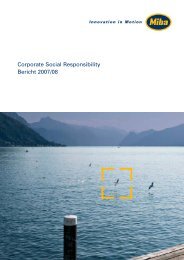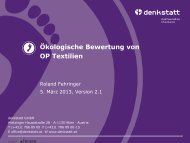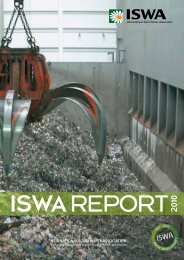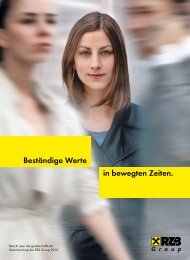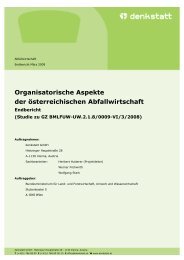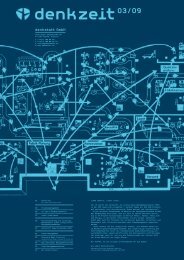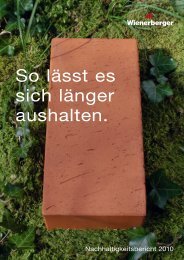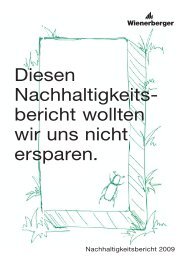INTERNATIONAL SOLID WASTE ASSOCIATION - Denkstatt
INTERNATIONAL SOLID WASTE ASSOCIATION - Denkstatt
INTERNATIONAL SOLID WASTE ASSOCIATION - Denkstatt
Create successful ePaper yourself
Turn your PDF publications into a flip-book with our unique Google optimized e-Paper software.
3.2. Scientific and Technical Committee<br />
Chair: Antonis Mavropoulos, Greece<br />
Vice-Chair: Maarten Goorhuis, Netherlands<br />
The Scientific and Technical Committee (STC) represents<br />
ISWA’s technical expertise and is governed by its Chair<br />
and the current Chairs and Vice Chairs of the ten ISWA<br />
Working Groups. The STC Members meet 3-4 times a<br />
year, often in connection with the Board meetings. The<br />
Chair of the STC is also a member of the ISWA Board.<br />
The STC is the technical and scientific think-tank of<br />
ISWA. During the last two years the STC has focused on<br />
improving the deliverability of WG’s through certain WG<br />
work programmes. For 2010 - 2011, the major contribution<br />
of the STC was the formulation as well as the implementation<br />
of the ISWA Grants scheme, in cooperation with GS<br />
and the Board. The successful evaluation of 33 proposals<br />
and support to the GS for the final contractual arrangements<br />
of specific projects has set up a new base for<br />
ISWA’s scientific and technical profile which will be<br />
substantially improved with the projects’ deliverables<br />
(see also chapter 3.6.4.).<br />
In 2010 the STC set seven important priorities for ISWA<br />
to address through the STC and Working Group Work<br />
Programmes. On a more technical level, the main<br />
activities of the STC in 2010/2011 have centered on<br />
these priorities and include:<br />
• Support of the Working Group on Climate Change<br />
to address the issue of Sustainable Waste<br />
Management and Greenhouse Gases<br />
• Implementation and creating content for the ISWA<br />
Knowledge Base (see chapter 3.4.2.)<br />
• Contributions and support to the ISWA Task Force<br />
on Globalisation, including a Workshop on the<br />
informal waste sector held in Buenos Aires and<br />
the preparation of a paper on Globalisation and<br />
Waste Management<br />
• Finalising two key issue papers, one on Waste<br />
Prevention, Minimisation and Resource Management,<br />
and another on Waste Trafficking. Beginning<br />
the preparation of a key issue paper on Food Waste<br />
• Strengthening and development of the International<br />
Waste Manager (IWM) Programme<br />
• Improving the recognition of ISWA members who<br />
voluntarily dedicate their precious time to tasks and<br />
activities of the organisation<br />
• Strengthening ISWAs Scientific Profile, through<br />
the establishment of a Task Force on Science<br />
The role of the STC is to conduct and coordinate the<br />
technical work of ISWA. The actions of the STC are based<br />
on its own objectives and annual work programme, as<br />
well as the work programmes for the different Working<br />
Groups. The Working Groups each function differently<br />
and this difference is respected as far as possible. The<br />
input from the Working Groups is based on voluntary<br />
work from its members and ISWA recognises the efforts<br />
made by its large number of Working Group members.<br />
Working Group Meetings are usually held 2 times a year.<br />
3.3. Working Groups<br />
The purpose of the ISWA Working Groups is to serve as<br />
the principal means for ISWA to deliver its technical and<br />
scientific programmes. As such, the Board and the ISWA<br />
membership look to the Working Groups for technical<br />
information and assistance, basic and applied research,<br />
professional meetings, and the development and dissemination<br />
of information about solid waste management.<br />
Currently there are 10 Working Groups with a total of<br />
around 250 members coming from more than 30 different<br />
nations:<br />
Working Group on Communication<br />
Chair: Gunilla Carlsson, Sweden<br />
Vice Chair: Suzanne Arup Veltze, Denmark<br />
The Working Group on Communication serves as the<br />
principal resource to ISWA in the field of communication<br />
and social relations. The Working Group addresses<br />
public concerns, comprising public support and public<br />
opposition to waste management policies, public<br />
consultation and participation, and communication<br />
and social issues with focus on basic human attitudes<br />
towards waste.<br />
The Working Group's main objectives are to:<br />
• cover communication and social aspects within<br />
the framework of waste management.<br />
• acknowledge and communicate the growing<br />
importance of public acceptance for a successful<br />
implementation and proper conduct of waste<br />
management policies, such as collection systems,<br />
siting of facilities, disposal fees, regulations and<br />
other related aspects.<br />
• foster the good reputation of professional waste<br />
management among the public by developing, coordinating,<br />
and disseminating strategies and tools<br />
aimed at increasing public support of and reducing<br />
public opposition to waste management strategies.<br />
• strengthen the role of communication as a<br />
determining factor for achieving satisfactory<br />
solutions in waste management practices.<br />
15



